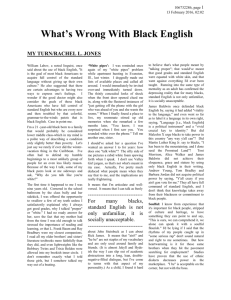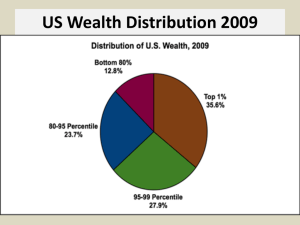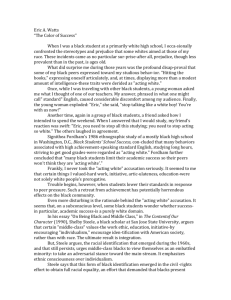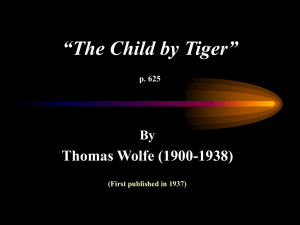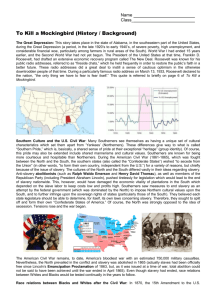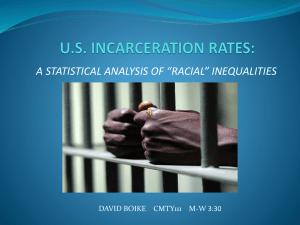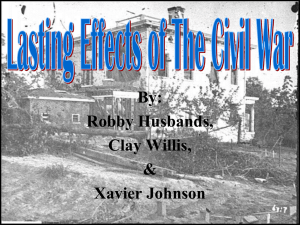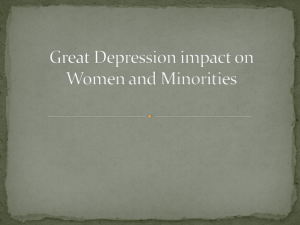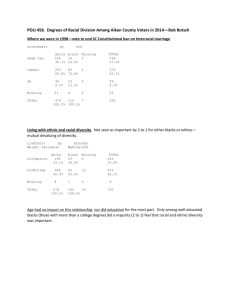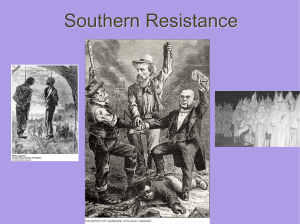AA - Post-Slavery Era
advertisement
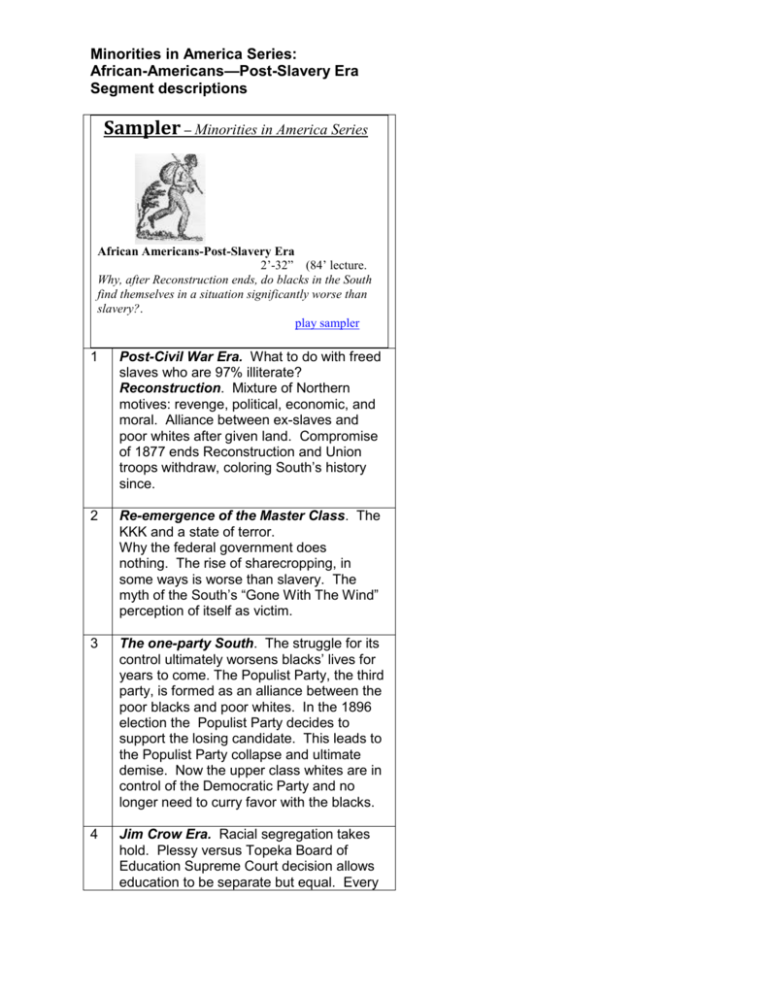
Minorities in America Series: African-Americans—Post-Slavery Era Segment descriptions Sampler – Minorities in America Series African Americans-Post-Slavery Era 2’-32” (84’ lecture. Why, after Reconstruction ends, do blacks in the South find themselves in a situation significantly worse than slavery?. play sampler 1 Post-Civil War Era. What to do with freed slaves who are 97% illiterate? Reconstruction. Mixture of Northern motives: revenge, political, economic, and moral. Alliance between ex-slaves and poor whites after given land. Compromise of 1877 ends Reconstruction and Union troops withdraw, coloring South’s history since. 2 Re-emergence of the Master Class. The KKK and a state of terror. Why the federal government does nothing. The rise of sharecropping, in some ways is worse than slavery. The myth of the South’s “Gone With The Wind” perception of itself as victim. 3 The one-party South. The struggle for its control ultimately worsens blacks’ lives for years to come. The Populist Party, the third party, is formed as an alliance between the poor blacks and poor whites. In the 1896 election the Populist Party decides to support the losing candidate. This leads to the Populist Party collapse and ultimate demise. Now the upper class whites are in control of the Democratic Party and no longer need to curry favor with the blacks. 4 Jim Crow Era. Racial segregation takes hold. Plessy versus Topeka Board of Education Supreme Court decision allows education to be separate but equal. Every Minorities in America Series: African-Americans—Post-Slavery Era Segment descriptions conceivable institution is sharply segregated. Lynching is wide spread. State and local governments are compliant. The federal government does nothing. 5. Early 20th Century The Progressive Era reforms totally neglected race. The racism of Teddy Roosevelt. President Wilson segregates D.C. civil service. Racial stereotypes in Hollywood films such as “Birth of a Nation.” 6 Black community debates over role of blacks. Booker T. Washington, an exslave, advocates blacks to learn a trade to make a living. W.E.B. DuBois, a Nornerner and academic scholar, a founder of NAACP, advocates blacks to strive for equally through education and political action. 7 Jack Johnson. A flamboyant black who dates white women is outrageous to whites, is a hero to blacks. He becomes heavyweight champion of the world, which enrage white pride and they look for “The Great White Hope” who will beat Johnson on a rematch. He is falsely arrested under the Mann Act, jumps bail, flees to Europe, becomes diminished, finally loses his title and his life tragically in a car crash in 1940. 8 WWI. Blacks in the army are segregated, but experience non-racist treatment by the French, which is resented by white soldiers. After the war, black veterans seek greater equality, are disappointed. 9 1920s. Jim Crow Era still in full swing. Harlem Renaissance. Great black cultural awakening. Literature, poetry, the arts, jazz, carries over to the white world. Marcus Garvey. Black Nationalism. Belief that integration will never happen. Back to Africa. Questionable success in 1920s. KIKK revival. National influence of Democratic Party. Minorities in America Series: African-Americans—Post-Slavery Era Segment descriptions 10 1930s. The Great Depression. The blacks know poverty which gets worse. Migration of blacks from rural South to cities in North during WWI for industrial jobs. Difficult transition. Met with hostility by Northern whites. Murderous race riots against blacks. FDR’s New Deal. Sharecroppers do not benefit from subsidies. Eleanor Roosevelt. Had been a genuine social worker. Sincere concern for blacks. Marian Anderson is blocked by Daughters of the Revolution from singing in D.C. Eleanor Roosevelt sponsors and attends her concert at the Washington Monument. She supports the skills of Tuskegee black pilots during WWII by insisting they pilot her. FDR appoints blacks to positions of authority in his administration. 11 WWII ends the Great Depression. Great need for labor for war production becomes golden opportunity for blacks (and women). Blacks meet the challenge of equal opportunity. They resist giving up jobs to returning white veterans. This is birth of modern civil rights movement. Episode of black soldiers on train being made to give up their seats to German POWs/ 12 Sports. Joe Louis. Boxer knocked out by German Max Schmeling, hero to Nazis. On rematch, he Kos Schmeling in 1st round, is hero to blacks and whites in America. Jackie Robinson. Sports are segregated. Robinson in separate Negro baseball league. Brooklyn Dodger owner, Branch Rickey, chooses Robinson as first black in white major league. He becomes 1947 rookie of the year. He endures hatred, viciousness by whites. Becomes enormous hero of African-Americans. 13 Cold War Era. Paul Robeson. High achiever in academics, sports. Earns law degree, does acting. His singing voice is unforgettable and brings great fame to him from around the world. He is associated Minorities in America Series: African-Americans—Post-Slavery Era Segment descriptions with Communist Party, and is a supporter of Russia. Very outspoken, he is ostracized by the U.S. as a subversive. His health suffers and he dies.
